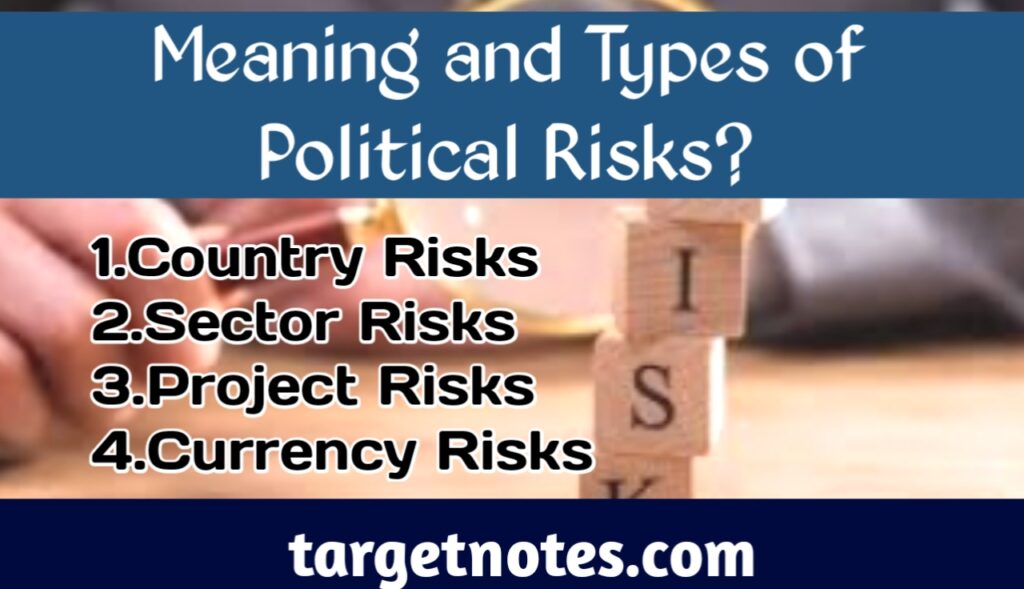
Explain Political risks in detail? and its Types
Explain Political risks in detail?
Political Risk is the risk that results from political changes or instability in a country. Such variability or changes always result into some kind of changes in the monetary, fiscal, legal, and other policies of the country facing the changes.
It has adverse impact on the working of the financial and commercial operation carried out by the country with the globe, and also of foreign enterprise located in host country. When a factor of instability is found with a country, such kind of risk crop up, and affect the foreign trade and exchange of the country adversely. The political risk results in to uncertainty over property rights and protection of wealth.
Types of Political Risk: Political Risk makes the impact on direct and indirect investments in the host country as well as the inter-trading transactions. The government measure also tends to limit the working and operations of foreign firm in the country.
Political Risk can broadly classify into the following four categories:
- Country Risks
- Sector Risks
- Project Risks
- Currency Risks
1. Country Risks: Country risks emanate from political, social and economic instability of a country, and bring hostility towards foreign investments. The hostility develops during the periods of crisis and forces the few governments to nationalize core industrial sectors based on strategic importance of the same.
The political risk takes several forms, such as nationalization or expropriation without indemnity (Compensation). The major episodes in this context are nationalization in Iran (1978), Libya (1969), Algeria (1962); nationalization with indemnity, such as in Chile (1971). Above all latent Nationalisation in terms of compulsory local or governmental participation constitutes another variant of political risk.
The concerns may veer (opinion or moving around some perception related questions) round the following questions:
- How stable is that government?
- Are government policies reasonably consistent over time?
- Is political power concentrated or diffused? Is it administered by a strong central government or by a more federal allocation of power?
- How insulated is the government from changes in public opinion, particularly with respect to foreign investment and trade issues?
- Is the government relatively strong or weak?
- What is the country’s record of compliance with international agreements, including sovereign debt obligations?
- How strong is the rule of law? Are laws and contracts generally enforced by an accessible, fair, and impartial judiciary?
- Are there social and economic factors of special concern (for example, environmental protection, human rights, labour standards, or inequitable allocation of wealth or income)?
2. Sector Risks: Generally, sectors like Petroleum, Mining, and Banking and so on are the sectors which are prone to greater element of political risk in a country in comparison to other sectors, because such sectors directly affect the climate for foreign investment.
For instances, petroleum sector has been nationalized in various countries such as Mexico (1938), Libya (1968), Iraq (1972), Venezuela and Kuwait (1975), Iran (1978) and Nigeria (1979). Likewise, nationalization of copper mines took place in Zaire, Zambia, and Chile and of Iron mines in Venezuela. Banking sector was nationalized in Guinea (1962), Vietnam (1975) and Iran and Nicaragua (1978).
3. Project Risks: Generally, not only country and sector but also the specific project is subject to risk. Multinationals establishes big projects in foreign countries, like electricity generation plants, dams, exploration of petroleum fields, etc. such project requires a huge investment in the beginning and as gestation period is long enough the risk enhances.
In the event of the project turning to be successful (for example finding an exploitable petroleum field), some governments are very demanding, and in certain situations, in particular, with the change of government the latter may even refuse to respect the engagement of the predecessor. In the year 1995, a new Government of the Maharashtra State in India refused to fulfill the agreement of the previous government for a large electricity project, named Enron project.
The need happens to focus on analytical framework before taking up an activity, to ensure that effective risk management can be achieved in practical context. The risk management activity to be undertaken with respect to particular industry, sector and/or project, and also the nature of parties involved in it, hence, the integration of all parameters is needed.
The assessment and determination of risk is a highly subjective and theoretical. In such circumstances, the decisions taken by the managers are more often influenced by management’s view of the future of the sector, and their desire to achieve the excellence performance, in addition to their knowledge based on past experience.
4. Currency Risks: A currency risk arises due to imbalance in the balance-of-payments of a country. In last decade, changes in the macro-economic situation and resulting national controls on capital flows and foreign investment and borrowings resulted into Asian crisis. It is needed to monitor various macro-economic situations and national control as they result into currency risk and it affects the private sector infrastructure projects.
In short, risk can be evidenced when the exact relationship between the causes of risk and its impact on the economy cannot be established. For this purpose by application of the statistical techniques, probabilities can be worked out for each possible event. It is always solely subjective assessment.
- Meaning and Types of commercial risks
- How can we minimize foreign trade risks?
- What are Arbitrage operations?
- Difference between Spot Market and Forward Market
- What is spot exchange?
- Agency agreement: Meaning, Features and Advantages
- Functions of Foreign Exchange markets
- structure of Foreign exchange markets
- Stability of Exchange Rate- Facts, significance, method, theories & warning
- Main Items Debit and Credit sides of the Balance of Payment
- Differences between Educational Administration and General Administration
- General Administration and Educational Administration
- Nature of Educational Administration
- Scope of School Administration
- Definitions of Educational Administration by Different Scholars
- Definitions of Educational Administration by Different Scholars
- Meaning of Educational Administration
- Principles of School Organisation and Administration
- Aims and Objectives of School Organisation
- School Organisation | Meaning of School Organisation | Meaning of School |Meaning of Organisation
Disclaimer




